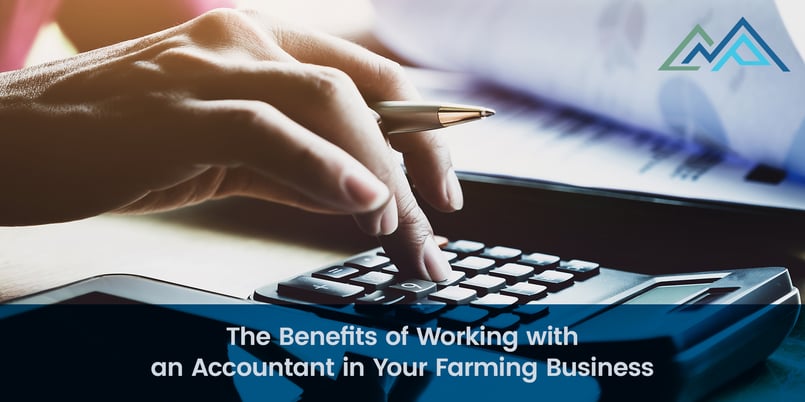Running a farm requires hard work and dedication (and lots of early mornings!). It’s also important to get help when you need it. At CMP, our farming clients and prospective farming clients sometimes ask us why they need to hire a farm accountant.

We understand that most farms run on a tight margin, nobody wants to spend money they don’t need to spend. That said, there are some significant benefits to working with an accountant in your farming business. Knowing what they are can help you make an informed decision about whether to hire one.
An Accountant Can Help You Know What Your Business is Worth
Most farmers love farming, not accounting. They own their business and recognize that they need some basic accounting know-how, but they aren’t trained accountants and they don’t know the ins and outs of evaluating a business, tax filings, and bookkeeping.
One of the benefits of working with a farming accountant is they can help you get a handle on what your farm is worth. Even if you have no intention of selling your farm in the future, it’s important to know how much your farming business is worth if you plan on leaving it to a family member or partner. Valuing your farming business each year is the best way to measure its performance.
An accountant can help you decide between three methods for evaluating your business:
- Capitalization of earnings
- Discounted cash flow
- The market value of assets, fewer liabilities
Each method has its benefits and your accountant can help you choose the one that best suits your needs.
Accrual Accounting Instead of Cash Accounting
Many farm businesses use cash accounting and there are some short-term benefits to doing so. For example, you can prepay expenses for things like seeds and fertilizer to reduce your tax burden if you have a good year. You can also defer payments into a new year if you choose.
The drawback of cash accounting is that it doesn’t truly reflect the financial strength of agricultural businesses. By contrast, accrual accounting gives you the opportunity to view your business through a wide lens.
For example, accrual accounting allows farmers to look at each part of their business and determine which segments are profitable and which are losing money. That’s useful information if you want to maximize your profits.
Accrual accounting can also help you decide if it makes sense to:
- Buy or lease new farm equipment
- Rent additional land to expand your harvest
- Switch crops
It also makes it possible to manage your risks and decide when and where to take chances to grow your farming business.
Get a Handle on Depreciation
As of late 2018, depreciation rules for farmers have changed. For example:
- The depreciation recovery period for new farming equipment and the property has been reduced from seven years to five years
- Some equipment purchased after September 27, 2017, may be eligible for 100% first-year bonus depreciation
- Farmers that opt out of the interest deduction limit must use an alternative depreciation system as a result.
The benefits of hiring a professional accountant with experience in the farming industry are that they’ll understand the depreciation rules and be aware of the recent changes. They can help farmers navigate the new rules to their advantage.
In addition to guiding you through the new depreciation rules as they impact your farming business today, an accountant can also help you interpret the rules to your advantage going forward. Understanding how depreciation works can have a positive impact on your bottom line and profitability.
Take Advantage of Tax Deductions
When you own a farm and you’re trying to get a handle on expenses, it might seem that preparing your tax return without assistance is a way to save money. However, the reverse can be true – and it could even cost you money if you miss important tax deductions.
Tax deductions are there for farmers and small business owners to use. If you miss even one deduction, it can have a significant impact on your profitability. The United States tax code is quite complex and it’s difficult for any small business owner to navigate its ins and outs.
For example, you can deduct wages you pay to farmworkers. These include the following:
- Raising animals, planting crops, and harvesting crops
- Maintaining farm equipment and tools
- Handling or processing any agricultural product of which more than 50% was produced by the farm
- Hatching poultry
- Salvaging timber or clearing brush and debris after a storm
- Producing and harvesting maple syrup and other products
The Tax Cuts and Jobs Act of 2017 also allow farmers to deduct the money they pay to their children who work on the farm provided that they have a true employer-employee relationship. The new law doubled the exemption for children under the age of 18.
Hiring an experienced farm accountant means that you won’t miss important deductions. Your accountant can help you review your income and expenses, identify potential deductions, and calculate them properly to minimize the chances of an audit.
Save for Your Kids’ Education
One of the biggest expenses that parents face is college tuition for their kids. With tuition costs escalating, it can be overwhelming to contemplate the costs – or how you’ll pay for them.
Hiring an accountant gives you an opportunity to discuss your college savings goals and come up with ways to give your children the education they deserve. If your kids work for you on the farm, the new tax laws have doubled the amount that children under 18 can be exempt from federal taxes.
And, since you won’t need to withhold employment taxes either, it means that the money you pay your kids for their work can go directly into a college savings fund or a Roth IRA. The result is a reduction in your tax burden and tax-free college savings account for your kids.
Plan for Succession and Retirement
Many farmers dream of one day handing the farms they’ve built over to their heirs, so they can retire. Retirement is within reach for anybody with careful planning, but without an accountant to help you plan, it may be difficult to reach your retirement savings goals.
The issue of succession planning looms for all farming and ranching operations. An accountant can help you choose a corporate structure that will minimize your taxes and reduce the burden on your heirs when you retire or die.
Of course, succession & estate planning isn’t only about money. It’s also a way to minimize conflict among family members by specifying what will happen when the ownership of your business changes hands, whether that happens because you retire or in the event of your death.
Tying your retirement savings plan to your succession plan can be helpful. Another benefit of working with a farm accountant is they can assist you in calculating how much money you’ll need to save to retire. They can help you evaluate your risk tolerance level and develop a savings and investment strategy to help you reach your goals and retire on schedule.
Conclusion
Even if your farming business is small, you can benefit from working with a professional accountant. Without assistance, you may end up paying more taxes than necessary, missing your short-term and long-term savings goals, and making decisions that will negatively impact your heirs.
Reach out to CMP to learn more about our farm and ranch accounting services.

















